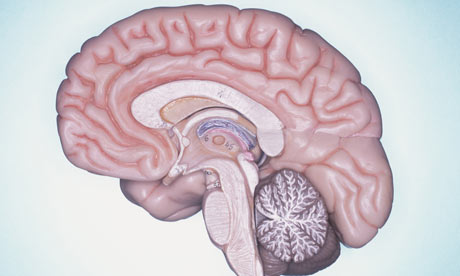
Supercomputers could render the wetware of the human brain redundant. Photograph: Gregor Schuster/Getty Images
Britain's leading thinker on the future offers an extraordinary vision of life in the next 45 years
Aeroplanes will be too afraid to crash, yoghurts will wish you good morning before being eaten and human consciousness will be stored on supercomputers, promising immortality for all - though it will help to be rich.
These fantastic claims are not made by a science fiction writer or a crystal ball-gazing lunatic. They are the deadly earnest predictions of Ian Pearson, head of the futurology unit at BT.
'If you draw the timelines, realistically by 2050 we would expect to be able to download your mind into a machine, so when you die it's not a major career problem,' Pearson told The Observer. 'If you're rich enough then by 2050 it's feasible. If you're poor you'll probably have to wait until 2075 or 2080 when it's routine. We are very serious about it. That's how fast this technology is moving: 45 years is a hell of a long time in IT.'
Pearson, 44, has formed his mind-boggling vision of the future after graduating in applied mathematics and theoretical physics, spending four years working in missile design and the past 20 years working in optical networks, broadband network evolution and cybernetics in BT's laboratories. He admits his prophecies are both 'very exciting' and 'very scary'.
He believes that today's youngsters may never have to die, and points to the rapid advances in computing power demonstrated last week, when Sony released the first details of its PlayStation 3. It is 35 times more powerful than previous games consoles. 'The new PlayStation is 1 per cent as powerful as a human brain,' he said. 'It is into supercomputer status compared to 10 years ago. PlayStation 5 will probably be as powerful as the human brain.'
The world's fastest computer, IBM's BlueGene, can perform 70.72 trillion calculations per second (teraflops) and is accelerating all the time. But anyone who believes in the uniqueness of consciousness or the soul will find Pearson's next suggestion hard to swallow. 'We're already looking at how you might structure a computer that could possibly become conscious. There are quite a lot of us now who believe it's entirely feasible.
'We don't know how to do it yet but we've begun looking in the same directions, for example at the techniques we think that consciousness is based on: information comes in from the outside world but also from other parts of your brain and each part processes it on an internal sensing basis. Consciousness is just another sense, effectively, and that's what we're trying to design in a computer. Not everyone agrees, but it's my conclusion that it is possible to make a conscious computer with superhuman levels of intelligence before 2020.'
He continued: 'It would definitely have emotions - that's one of the primary reasons for doing it. If I'm on an aeroplane I want the computer to be more terrified of crashing than I am so it does everything to stay in the air until it's supposed to be on the ground.
'You can also start automating an awful lots of jobs. Instead of phoning up a call centre and getting a machine that says, "Type 1 for this and 2 for that and 3 for the other," if you had machine personalities you could have any number of call staff, so you can be dealt with without ever waiting in a queue at a call centre again.'
Full article HERE
No comments:
Post a Comment